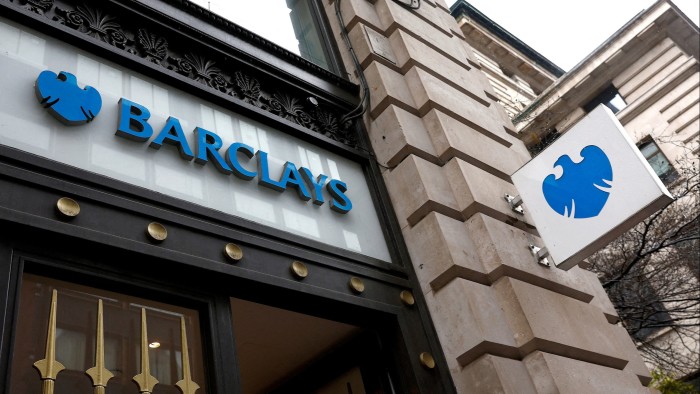Unlock the Editor’s Digest for free
Barclays has revealed a series of alleged misconduct issues that have put it in the crosshairs of investigators once more.
The FTSE 100 banking group is being probed by the Financial Conduct Authority over alleged lax controls against anti-money laundering and financial crimes, Barclays said on Thursday.
The British lender disclosed the civil enforcement investigation in its annual report published alongside its fourth-quarter earnings, which included a £90mn provision for potential car finance mis-selling costs as a result of a separate FCA probe.
The new money-laundering investigation “focuses primarily on the historical oversight and management of certain customers with heightened risk”, Barclays wrote, adding that it had been co-operating with the FCA.
It is the latest clash between Barclays and the FCA, which fined the bank £40mn late last year over payments to Qatari investors linked to an emergency capital injection in 2008 that the regulator called “reckless”. The bank also landed a £72mn FCA fine in 2015 for sloppy financial-crime checks around wealthy Qatari clients.
The fresh disclosures come two years after the Financial Times reported that the FCA had ordered an independent review of Barclays’ systems used to detect and prevent financial crime. The regulator put banks more widely on notice last year to improve their money-laundering controls.
Barclays is also facing a separate challenge from UK tax authorities over its interpretation of bank levy legislation, an annual charge applied to UK balance sheets that was introduced in the aftermath of the financial crisis.
The two fresh legal issues present a problem for the British lender, which was already caught up in the wider car-finance mis-selling scandal; an issue that analysts have estimated could cost the industry billions.
Barclays exited the market in 2019 and is not believed to be as exposed to the issue as rivals such as Close Brothers, Lloyds Banking Group and Santander UK.
The FCA did not immediately respond to a request seeking comment.
The update comes as Barclays reported a £1bn net profit for the fourth quarter, up significantly from the same period the previous year when the bank posted a net loss of £111mn that was largely down to structural cost cuts. Group revenue was up 24 per cent to £7bn, compared with the £6.7bn analysts had anticipated.
Investors marked the shares down 5 per cent in mid-morning trading, however, as better than expected results failed to translate into an improved outlook for next year.
“Overall a solid set of results, but little new to get excited about either,” said Andrew Coombs, an analyst at Citi. “This, plus the strong run-up in the share price over the past year, may temper any initial reaction.”
Barclays’ shares have more than doubled since chief executive CS Venkatakrishnan unveiled his restructuring plan last year, which promised £10bn to shareholders over three years and a commitment to significantly expand in its home market, as well as to limit the amount of capital consumed by its investment bank.
Investment banking nevertheless provided a boon to Barclays’ quarterly earnings as equities and fixed income traders benefited from market volatility in the US ahead of the election.
Income from equities trading was up 40 per cent year on year to £604mn, while fixed income trading income rose 29 per cent to £934mn. Barclays also reported a 22 per cent increase in investment banking fees while its debt capital markets business lagged with income up 9 per cent.
The performance falls broadly in line with the strategy set out by investment banking co-heads Taylor Wright and Cathal Deasy in October to focus more on advisory and equity capital markets and become less reliant on debt underwriting.
Barclays reported credit impairment charges of £700mn, up approximately 17 per cent from last year and slightly higher than expected.
“We see Barclays stock price in ‘travel and arrive’ mode considering its 15 per cent [year to date] performance with the results impacted by higher restructuring cost levels compared to consensus,” said Kian Abouhossein, an analyst at JPMorgan.
Venkatakrishnan and finance chief Anna Cross shot down the idea that the bank would bid for Santander’s UK business. The Financial Times previously reported that the Spanish lender last year rejected a “low ball” offer for its UK retail business from Barclays.
The bank also disclosed in its annual report that chair Nigel Higgins has received a three-year extension and a pay rise of 8 per cent to £925,000.
Additional reporting by Martin Arnold in London

